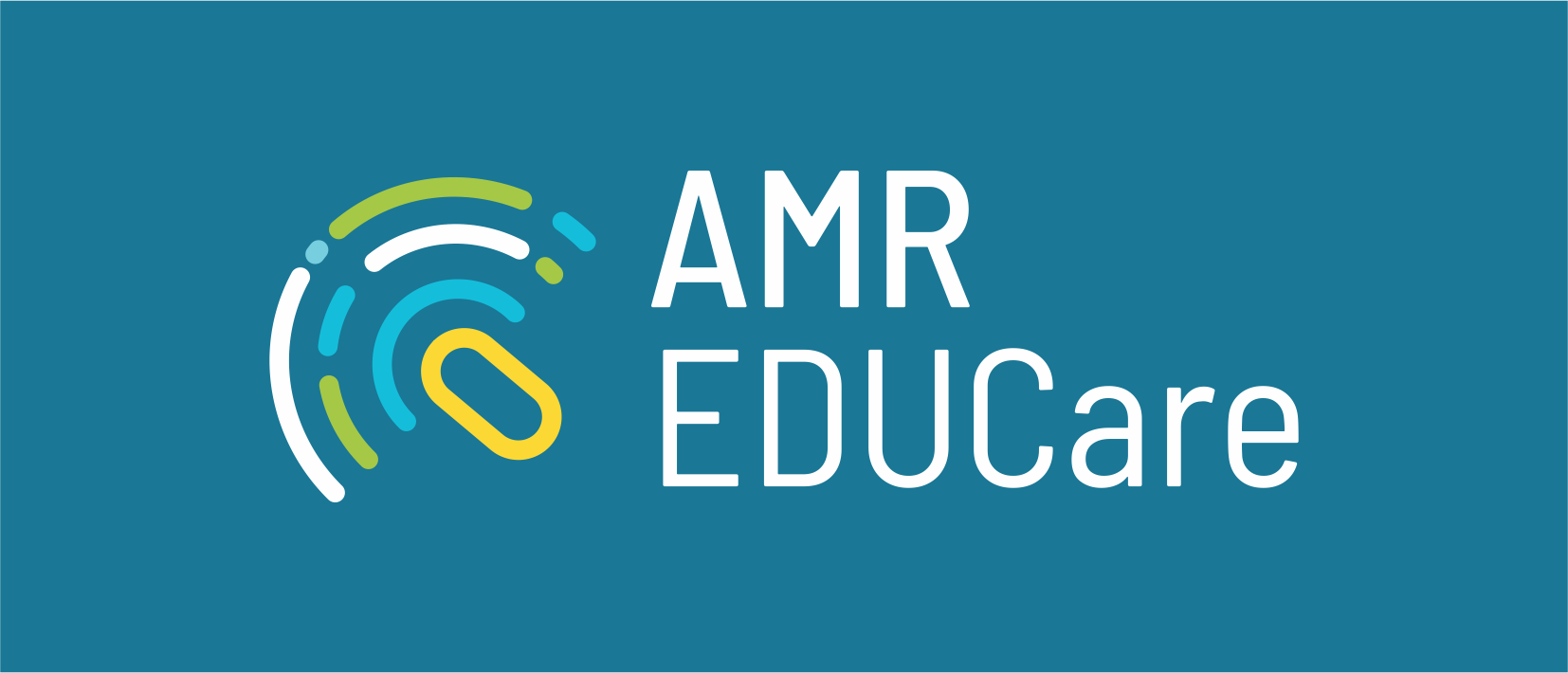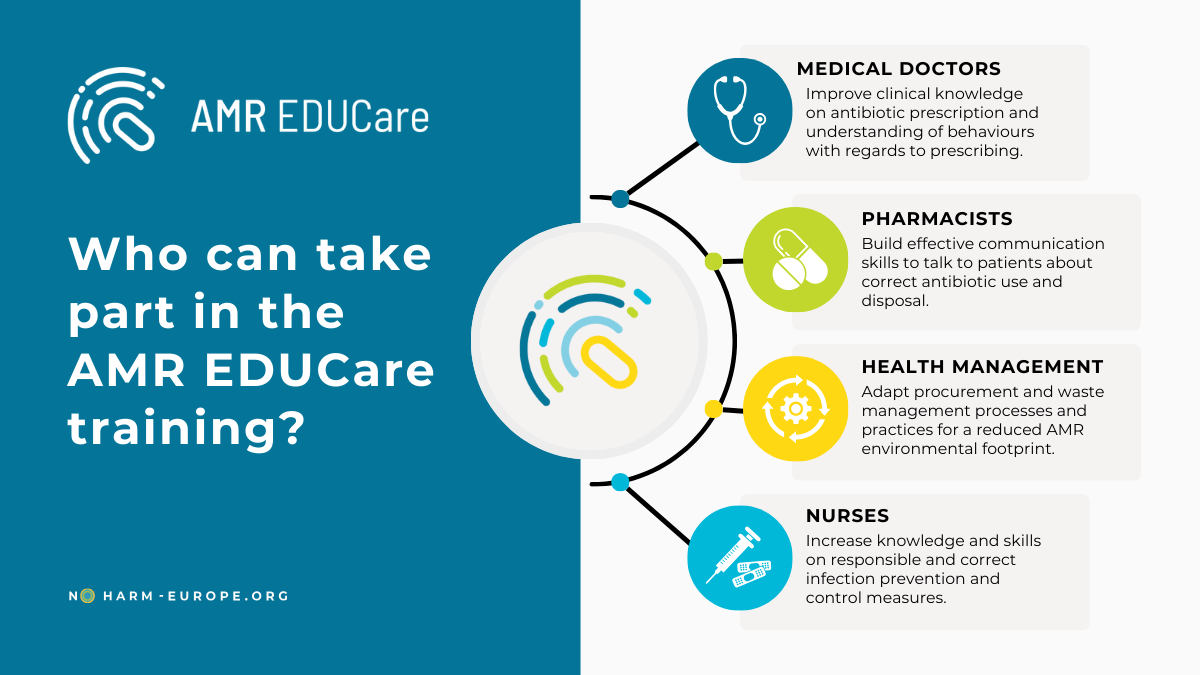AMR-EDUCare project

Contact: Erik Ruiz
Quick links:
- Who can take part in this training?
- Are the courses limited to professionals from Greece, Hungary, Italy, Lithuania, Portugal and Spain?
Antimicrobial resistance (AMR) causes 33,000 deaths annually in Europe. If no further action is taken, AMR could cause the annual death of 10 million people globally by 2050. This means that AMR could cause more deaths than cancer and diabetes combined. Furthermore, the use of last-resort antibiotics in European hospitals is increasing and antibiotics that were ruled out for use in humans because of their toxicity are now frequently used to treat resistant bacteria.
Funded by the EU4Health Programme, the AMR EDUCare project will develop educational materials and training for health professionals to reduce the spread of and exposure to antimicrobial resistance (AMR) in Greece, Hungary, Italy, Lithuania, Portugal and Spain.
Our project aims to transform the healthcare industry by equipping clinical and non-clinical staff with the knowledge, skills, and competencies needed to tackle AMR. The project will expand doctors' antibiotic prescription knowledge and improve their communication skills to manage patient expectations on antimicrobial prescription. The training will also upskill health management professionals on processes and techniques to reduce and better manage antimicrobial waste.
The unique teaching methodology of the AMR-EDUCare project combines clinical and technical topics with soft skills, such as patient communication, digital skills, and behaviour change interventions.
By providing accessible, self-paced and multimedia e-learning courses (including resources such as podcasts, videos and apps) we aim to ensure that doctors, pharmacists, nurses and health managers can adapt their busy schedules to this training.
Main goals of the project
The project will achieve the following specific objectives:
- Reduce overprescription practices of training participants and therefore the overuse of antimicrobials for human health in six European Union (EU) Member States (Spain, Portugal, Italy, Hungary, Greece, and Lithuania);
- Improve the knowledge and skills of medical doctors on responsible antimicrobial prescription;
- Improve the knowledge and skills of health management professionals on antimicrobial procurement, disposal and waste management;
- Improve the communication skills and capacity of medical doctors, nurses and pharmacists to promote the responsible use of antimicrobials among the general public.
For this purpose, the AMR-EDUCare project will train 4,150 healthcare professionals (including medical doctors, nurses, pharmacists and health managers) from the target countries.
Are the courses limited to professionals from Greece, Hungary, Italy, Lithuania, Portugal and Spain?
Healthcare professionals from Greece, Hungary, Italy, Lithuania, Portugal and Spain are the main target of the project and will have preferential access to the training, including advantages such as translation of all the modules and educational materials into their own languages. However, professionals from other EU countries will also be able to access the training.
Join the training for free
Training modules
Antimicrobial prescribing optimisation
Antibiotics are widely used in primary care, accounting for more than 80% of their global use. However, their overuse and misuse is associated with increasing AMR, making it crucial for medical professionals in different specialties to stay up-to-date with the latest advances in antibiotic prescribing optimisation.
This module will ensure that health professionals in the target countries have access to resources needed to make informed decisions regarding antibiotic prescription and use.
Antimicrobial waste reduction and management
The AMR curricula for healthcare professionals and health managers currently lack sufficient emphasis on antimicrobial waste management. Green procurement is not yet widely adopted in Europe and is often viewed as a novel concept.
This module will empower healthcare professionals and health managers with the tools they need to identify practices that generate excessive waste, and provide them with the necessary resources to address this issue. By promoting sustainable practices, we aim to reduce waste and the negative impacts of pharmaceutical production.
Patient communication and empowerment
Antibiotic prescription practices need to be improved. Doctors are often pressured by patients to get an antibiotic prescription. It is therefore essential that patients understand their role in reducing AMR and the importance of the issue. We aim to empower patients by increasing their awareness and understanding of the appropriate use of antibiotics, as well as the potential impacts of antibiotic misuse. The training modules will support health professionals (primary care doctors, nurses and pharmacists) on informing patients on key messages about AMR, antibiotic misuse, mismanagement impacts, and habits to prevent AMR infections.
What will make this training different from already existing AMR Training?
The training will provide cutting-edge digital skills and behaviour change tools that participants will be able to incorporate in their day to day work. Through this approach we aim to:
- Reduce the use of antibiotics and combat antimicrobial resistance (AMR) by developing digital skills among healthcare professionals, which includes improving their technological, management, logistics (waste reduction, waste management), and procurement skills.
- Identify and implement technological tools that have the potential to change the behaviour of stakeholders involved in antibiotic use and management and enhance the effectiveness of AMR reduction strategies.
Project deliverables:
- D1.1 State-of-the-art needs analysis on AMR training in the target countries
- D2.1 Training courses and materials on antimicrobial prescription for the primary care healthcare workforce
- D3.1 Training modules on the critical point of control, reliable surveillance and risk assessment and digital solutions for the management of antimicrobial waste
- D4.1 Training modules on communication skills for patient engagement
- D4.2 Informative materials for patients
- D5.1 Report on IT tools for behavioural change
- D6.1 Monitoring and Evaluation framework
- D6.2 Co-Created WP-specific Impact Cases
- D6.3 Competencies Framework
- D6.4 Final evaluation report (Assessment of competencies)
- D7.1 Communication and dissemination plan
- D7.2 Project leaflet
- D7.3 Final dissemination report
- D7.4 Knowledge portal
Project consortium

The content of this page represents the views of the author only and is his/her sole responsibility; it cannot be considered to reflect the views of the European Commission and/or the European Health and Digital Executive Agency (HaDEA) or any other body of the European Union. The European Commission and the Agency do not accept any responsibility for use that may be made of the information it contains.


